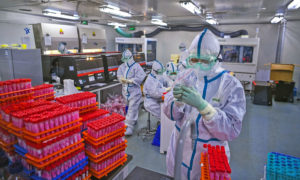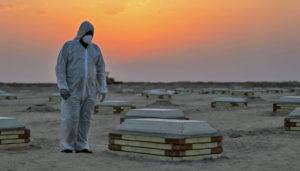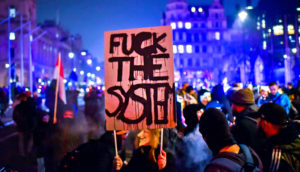Covid cases are rising again. In the UK, they have broken through the 200,000 infections-a-day threshold for the first time since April. In America, the sixth wave is well under way. In countries that kept the disease at bay for years, such as Taiwan and New Zealand, numbers are shooting up, driven by milder but highly infectious versions of the Omicron variant. The virus has not gone away, even if its death toll is much lower. But what has disappeared is any real or urgent interest from the media and the scientific establishment in finding out how it started.
Imagine if the accidental launch of a nuclear missile had killed 21 million people. It’s hard to believe the world would shrug and say: let’s not bother finding out how it happened. The Covid pandemic has killed around that number and disrupted the lives of billions. Nothing like it has happened in more than a century; it is the greatest cause of global suffering since the Forties. Yet we still do not know how it started, and much of the world seems to be increasingly incurious to find out.
We co-authored a book, Viral: The Search for the Origin of Covid-19, on this topic in 2021 and it proved to be an odd experience. Eschewing speculation and sticking to what we could prove, we delved deep into the evidence and wove together the threads that linked bat viruses from southern China or Southeast Asia with an outbreak in Wuhan in late 2019. We concluded that it was impossible to be sure yet, but two theories were plausible: spillover from an animal to a person at a market, or an accident in a laboratory or during a research field trip.
In this we are in line with the US government, the G7, the World Health Organisation and the general public, all of whom are on record as saying that they think a leak from a Wuhan virology lab is a strong possibility that deserves to be investigated. The latest WHO report two weeks ago confirms this, saying that it is important “to evaluate the possibility of the introduction of SARS-CoV-2 into the human population through a laboratory incident”. That is huge news. It means that an accident caused by human error may have happened on the same scale as a nuclear missile destroying New York.
Our book received praise from readers: we received letters and emails from senior scientists, politicians, businessmen, journalists, and others commending it as a non-fiction whodunnit.
All that was gratifying. But it stood in marked contrast to the reaction in much of the media. CNN invited us on to discuss the book then cancelled at the last minute — at the behest of their health editor. The BBC simply ignored the book altogether, as did the other mainstream US and UK networks. The topic remains taboo in much of the mainstream media. Reviews were mostly bad — in both senses of the word. That is to say, they were highly critical and inaccurate. In some cases, the authors said things that made clear they had not read the book but had made up their minds to dislike it. Not one but two virologists told us on Twitter that the book was full of lies — and that they had not read it. An odd thing for anybody to admit to, especially a scientist.
The Smithsonian Institution in Washington invited us to give a presentation on the book, then cancelled the invitation. We asked the Royal Society if they had considered a debate on the topic of the origin of the Covid pandemic: no, they said, it’s not a proper topic for scientific discussion. What? We tried a couple of other learned societies: no, sorry, too controversial. Seriously.
Opinion polls show that the public generally thinks the virus began with a lab leak. So virologists who think it did not ought to be keen to have an opportunity to make their case, rather than avoid debate.
We think we know why people feel so threatened by Viral. After all we are not lab-leak extremists and we have also been attacked by those who are. But by taking down credible moderate voices, our critics within the scientific establishment are polarising the issue and casting the lab origin hypothesis as one that is only championed by anti-science or uninformed groups. As Professor Jonathan Haidt of New York University has pointed out, on social media these days it is common for activists to spend a lot of time criticising moderates on their own side of an argument.
The Chinese authorities have made it clear that any discussion of a possible lab leak is — in their view — xenophobic bullying. “The lab leak theory is totally a lie concocted by anti-China forces for political purposes, which has nothing to do with science,” said China’s Foreign Ministry spokesman on 10 June. (Although they also argue that a lab leak of Covid from US laboratories should be investigated.) This stance from the Chinese government puts universities and scientific journals in a tough spot because of their increasing dependency on Chinese funding and patronage.
Science funders are embarrassed to note that, as Jeffrey Sachs of Columbia University has recently documented, some of the funding that went into collecting and manipulating bat viruses in Wuhan came from the West, so better to let that sleeping dog lie. Virologists are worried that fingering a lab leak will affect their flow of grant money or result in more oversight and regulation of virology research. One scientist told us that: “If we investigate and expose an error on the part of scientists, then the public will no longer trust science.” As if choosing to deliberately not uncover a possible error would make people trust science more.
Science journalists generally see their job as cheerleading for scientists, not investigating them, so have largely refused to engage with the evidence for a lab leak. Some environmentalists would prefer the episode to be a cautionary tale about the destruction of rainforests. The issue has rapidly become partisan with Republicans largely driving the calls for an investigation. Bipartisan efforts and proposals to investigate the origin of Covid — a pandemic that has taken the lives of more than a million Americans — have proceeded at a glacial pace. Many younger commentators see blaming a Chinese lab as more racist than blaming Chinese eating habits for some reason (despite the fact that no bats or pangolins were found to be sold in Wuhan markets in the years leading up to the pandemic). And so on.
In short, there is a confluence of vested interest that results in a lot of motivated reasoning. It is hard to find anybody, with the exception of a few fringe media outfits, who is being paid as part of their day job to investigate the possibility of a lab leak without fear or favour. The people who have persisted in keeping the lab-leak hypothesis alive, against staunch opposition by some virologists and the media, are doing it in their spare time and at their own expense — as are we.
One of the commonest criticisms we have received from scientists is that by writing a book we are profiteering from a pandemic, an odd charge to come from people also earning salaries and grants to investigate the virus and its effects. Anyway, we took an early decision before the book was published, which we made public, to give away half of the proceeds from the book to charity.
Perhaps the oddest reaction we get from scientists, politicians and even journalists is this: why does it matter? The pandemic has happened, it cannot be undone and we may never know how it started, so why rake over the coals and stir up animosities? We find this astounding as an argument. If we don’t know how this pandemic started, how can we inform strategies to stop the next one? If we don’t investigate, what signal does that send to bioterrorists? If we shrug our shoulders, what respect does that show to the memory of the dead? The risk of lab-based outbreaks does not disappear if we pretend they are unlikely.
Another excuse we hear for the refusal to engage in the debate is that the Chinese government is secretive and authoritarian, so it will never share the vital information that we need to determine the origin of the virus. This seems to us defeatist, as is the often-expressed view that we cannot know how this pandemic started unless we get cooperation from the Chinese authorities. Like Dr Sachs, we think it is possible that a diligent investigation of the kind that has not yet been launched may yet solve the mystery even without Chinese cooperation. A steady trickle of revelations from within Western institutions has confirmed our view.
The World Health Organisation did in 2020 launch an inquiry into the source of the virus, which unfortunately gave Western governments the excuse to do nothing. It proved to be an embarrassing farce: months of dilatory negotiations over terms of reference, followed by the appointment of experts with conflicts of interest, then a brief chaperoned visit to a few spots in Wuhan, culminating in a press conference at which the WHO meekly endorsed an evidence-free Chinese theory that the virus had been imported to Wuhan on frozen food possibly from overseas. More than a year later, the WHO has now published a preliminary report from its scientific advisory group for the origins of novel pathogens (SAGO), which admits that the lab leak needs to be investigated — 30 months after the pandemic began.
That this pandemic flared up in a powerful and influential country with no free press, little freedom for scientists to speak out and centralised control of information by a totalitarian dictator certainly makes it uniquely difficult to investigate. Had it occurred in almost any other country in the world — the US, India, Brazil, even Russia — we think it would have been impossible to prevent the truth emerging.
But China’s refusal to be transparent has been matched by a determined effort on the part of many Western scientists to prevent a proper investigation getting under way. Despite thinking privately that a lab leak was most definitely possible — as shown by emails revealed through freedom of information requests — these scientists now appear even more keen than the Chinese authorities to tell the media that the matter is settled and they are sure the first infection happened in Wuhan’s seafood market.
Yet no infected animal on sale in the market or elsewhere in China has been found, and there is no evidence of exposure to SARS-like viruses among Wuhan market traders prior to the Covid outbreak. The amount of evidence for a wildlife trade origin of the virus is comparable to that for a research-related origin — both are plausible ways for a bat coronavirus from southern China or Southeast Asia to have made its way to Wuhan in central China, but both pathways remain poorly investigated. As we say to those who claim it definitely came via wild animals in the market, we don’t think you are certainly wrong, but we do think you are wrongly certain.
Viral: The Search for the Origin of Covid-19 is now out in paperback.
Disclaimer
Some of the posts we share are controversial and we do not necessarily agree with them in the whole extend. Sometimes we agree with the content or part of it but we do not agree with the narration or language. Nevertheless we find them somehow interesting, valuable and/or informative or we share them, because we strongly believe in freedom of speech, free press and journalism. We strongly encourage you to have a critical approach to all the content, do your own research and analysis to build your own opinion.
We would be glad to have your feedback.
Source: UnHerd Read the original article here: https://unherd.com






